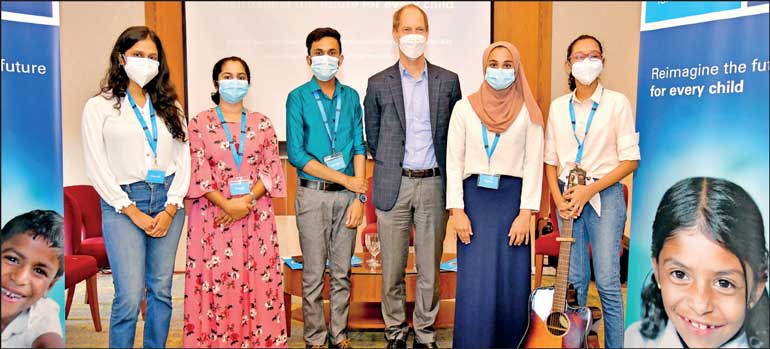Sunday Feb 22, 2026
Sunday Feb 22, 2026
Thursday, 9 December 2021 00:00 - - {{hitsCtrl.values.hits}}

Young panellists and cover artist with the UNICEF Sri Lanka Representative during the event. From left: Tharushi Weerasinghe, Bhagya Abeyrathne, Jathujan Mahendran, UNICEF Sri Lanka Representative Christian Skoog, Yumna Zaheed and Manethree Walpola
UNICEF marked its 75th anniversary and the Convention on the Rights of the Child by hosting a panel discussion titled ‘Reimagine a future for every child’ reflecting on the progress made over the years and highlighting the pressing issues facing children and young people in Sri Lanka.
Over the past few months, UNICEF engaged with nearly 3,000 young people from 16 years of age to adulthood, to better understand their needs and concerns on education, climate change, soft skills, mental health, ending violence and the impact of the COVID-19 pandemic among others. The consultations are also part of UNICEF’s plan to ensure its new Strategic Plan integrates the views and ideas of children and young people.
The issues that the current young generation of Sri Lanka face have been aggravated by the COVID-19 pandemic. Although the virus itself has had mild effect on young people, they are the worst affected with its consequences. The burden of unemployment leading to loss of incomes for families, disruption in education, exposure to exploitation and abuse among others, disproportionately rests on children and young people.
Participating in the panel discussion were three young people, who have been involved in the consultations. They spoke of their individual experiences, some of the issues they are engaged in and the brighter future they reimagine for every child.
Bhagya Abeyrathne, 20, lives in Ratnapura. Speaking on the issue of climate change and the environment, she said: “Climate change is one of the greatest threats facing young people. Ecosystems that are crucial to a healthy environment are being destroyed while increased natural disasters are affecting climate change and having a devastating impact on the well-being of children. We can be agents of change but our voices advocating for Environment and Climate Change lack space.”
Unlocking attention to mental health, Jathujan Mahendran (20) from Batticaloa, connected with his personal experience related to suicide. “We need to remove the stigma, ignorance and limited awareness around mental health. For children everywhere, COVID-19 has turned lives upside down and has disrupted or halted critical mental health services. Lack of access to treatment, including counselling services in schools and limited support systems and qualified professionals for mental health has highlighted how vulnerable children and young people are,” said Jathujan.
Highlighting the issue of social cohesion including discrimination and lack of inclusion, 17-year-old Yumna Zaheed from Colombo said: “I have the right to be protected from violence, exploitation and abuse. Yet, as a young person I have personally encountered bullying and discrimination. Even social media today is a space rampant with bullying. We need to live in a protective environment free from violence, exploitation, and unnecessary social differentiations based on caste and class. This should not stop in times of crisis or emergency, rather it must be enhanced, especially for our survival, development and well-being.”
Based on their observations and experiences, these young people have demonstrated the power and crucial need for young people be heard and their opinions considered in finding the solutions to their own problems. The three speakers identified a range of solutions at different levels to address the myriad of issues that confront Sri Lanka’s young generation who are the future of the nation
Each panellist briefly provided bold and urgent actions to address the issues raised by them:
Bhagya urged that immediate measures be taken to reduce pollution by creating awareness of the devastating impact of climate change and the destruction of special ecological and bio-diversity systems. She also promoted the need for a socially responsible nation of individuals and communities for environment conservation.
Jathujan called for the improvement of ‘life skills’ or ‘socio-emotional skills’ such as problem- solving, negotiation, managing emotions, etc., to help young people affected by crisis cope with trauma and build their resilience. He urged the authorities to increase access to mental health services of adequate quality by increasing government expenditure for the health sector
Yumna echoed the need to promote the understanding of children and youth about embracing diversity among different ethnicities, cultures, classes, gender, abilities, also among those with disabilities and different linguistic capabilities. She also stressed the importance of imposing strict legal measures and zero tolerance policies on bullying and any form of violence against children and youth in schools and universities.
Beyond what the three panellists shared, some of the issues that the young people highlighted during the consultations include deep concerns and demand for urgent action on matters such as academic pressures relating to performance at national exams, the risk of being left behind and marginalised due to lack of access to technology and digital tools for their education, COVID-19 bringing about mental distress, encountering food insufficiency due to lack of income and resources and inadequate social protection programmes as they undergo job training.
A few years ago, John Lennon’s song for hope and peace, ‘Imagine’, was part of a UNICEF led #Imagine initiative to help inspire a global movement towards a better future for every child. To remind and inspire us to ‘Reimagine a future for every child,’ 14-year-old Manethree Walpola, a cover artist, did her own rendition of the song as a symbol of hope for every child.